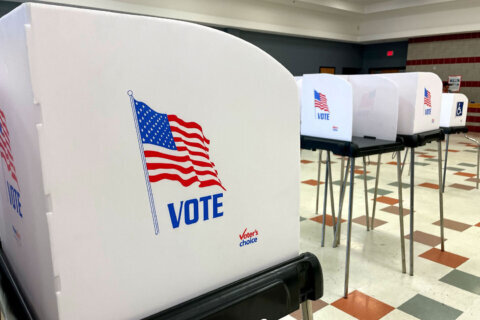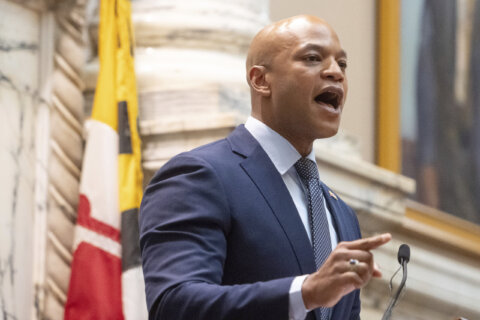The NCAA basketball tournament tips off this week, an event that’s worth hundreds of millions of dollars to the college athletics industry.
Eventually, a big chunk of that money makes its way in varying amounts to individual schools, depending on conference affiliation and the success achieved in the postseason.
Unfortunately for colleges in Maryland, the event won’t be quite as lucrative as their athletic departments would have hoped.
Public colleges in the state participate in various levels of competition: Maryland, UMBC, Towson, Maryland-Eastern Shore and Coppin State all play at the Division I level. Frostburg State and Bowie State participate in Division II athletics, and Salisbury plays at the small Division III level.
Only Salisbury finished the 2021 fiscal year with a positive balance. Frostburg State took advantage of a special exemption passed by the Board of Regents to use regular school finances — almost a million dollars total — to avoid incurring any debt during the previous school year.
Every other school reported losses in the millions of dollars, with the exception of Towson, which was also the only school that used federal CARES act money to help eliminate most of the debt it carried into the start of the 2021 fiscal year.
In College Park, the University of Maryland entered the 2021 fiscal year — which started July 1, 2020 — with a deficit of over $52 million. Despite paring back expenses departmentwide by about 10%, it operated at a nearly $21 million deficit to finish with a deficit of over $73 million.
“It’s got the most complicated set of financial arrangements, far and away, within the university system,” said Bob Page, associate vice chancellor of financial affairs for the University System of Maryland.
“This $21 million operating result should be seen as a significant positive for the fiscal year. The revenue losses came from the decision by the conference and the institution to forgo in-person attendance at sporting events, which itself caused a reduction in normal revenues to the program of $15 or $16 million.”
He went on to explain that the school had a number of reasons for operating at a deficit last year, citing the ongoing payout of the exit fee associated with leaving the ACC for the Big Ten as one reason. Ellen Herbst, the vice chancellor for administration and finance, said it’s believed the school is lined up for a significant boost in broadcast TV revenue as the Big Ten gets ready to renegotiate TV rights.
“We all recognize that the amounts shown here are large,” Herbst said. But the way the school is working to improve its financial picture, she said, “is a best practice.”
Herbst said they are confident it is “being managed well at the appropriate levels at the university.”
Linda Gooden, who chairs the university system’s Board of regents, also expressed confidence in the bigger financial picture.
“Looking at these numbers in isolation can lead one to be more concerned than they should,” Gooden said. “There is a level of attention to these numbers that goes well beyond what people see in this informational review.”
Ultimately, the pandemic might lead the university system to reconsider how college athletics are funded at public schools.
In Maryland, athletic departments are required to be “self-supporting,” though to get there schools often tack on hundreds of dollars in fees to the amount every student pays to attend school. For instance, at Bowie State, each student pays about $800 a year in fees that help support athletic programs, which is nearly 10% of the total cost to attend classes there for a year. In College Park, about $200 of the nearly $1,000 in fees that students pay each semester go to athletics.
Brian Barrio, the athletics director at UMBC, said the current setup causes students to wince.
“There’s a lot of gray area in the current setup,” said Barrio, who noted that an on-campus arena that’s considered the home of the athletic department is also the home to classes and other on-campus events.
“This is something that’s different from some of the other state systems I’ve worked in,” he added. “I fully understand why the requirement is in place and it’s been a challenge for us. It creates some optical challenges with general students, and we’re kind of going through that right now, as well as gives us less flexibility around some of the things financially that we’d like to do.”
It wouldn’t be the last time the use of athletic fees to make the departments self-supporting, as is required, would be brought up.
“Our approach to this may evolve,” said Page. “We’re taking a look at how the policy is written and whether or not that’s the best approach to satisfying that regents’ value or expectation. In the future we may propose or bring back to this committee first, possible adjustments or changes or loosening of the arrangements in terms of the self-support expectation.”
But at this point, it’s not a topic that’s been discussed yet by university presidents around the state, or even lower down the chain of command at the state’s colleges. Herbst indicated there would be lots of conversations in the future before a recommendation would be made in one direction or the other. But it’s clear there will be more discussion about the rule.
“These deficits are one reason why we’re looking at the board policy and the requirements that programs be operated on a self-support basis with an idea that institution presidents maybe need more avenues to resolve these accumulated deficits over a period of time with moneys from other activities at the university,” said Page. “That’s something we’ll continue to think about.”








